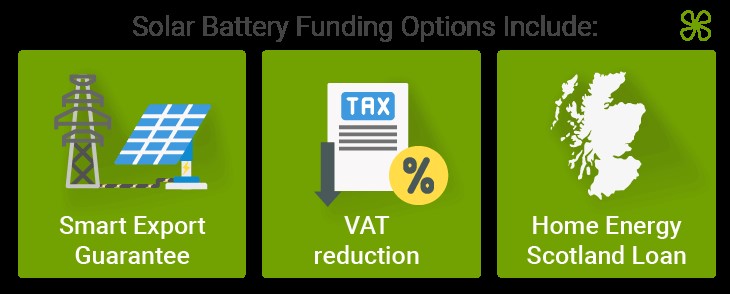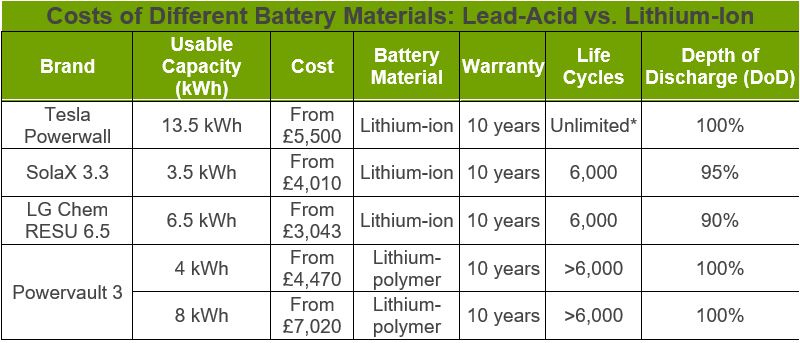Are Solar Batteries Cost-Effective ?
- The chemical components that make up the battery, its life cycle, its storage capacity, and its useable capacity are a few of the factors that significantly affect the price of solar batteries. In the UK, the price of a storage system can normally range from £1,200 to £6,000 due to these considerations.
- A solar battery's lifespan is 5 to 15 years, therefore over the course of the life of your solar panels, the battery may need to be replaced more than once (typically 20-30 years). The overall cost of building a whole solar panel system may go up as a result.
- A home battery storage system is unquestionably beneficial if you are not home during the height of the sun. Electricity can be stored in your solar batteries for usage at night when you are at home.
Learn More in Our Guide
Why Do You Need a Solar Battery Storage System?
Why Do You Need a Solar Battery Storage System?
Solar battery with solar array pairing is a relatively new but efficient technique. Solar battery storage offers four major advantages:
- Invest energy for future usage.
- Considerably reduce your energy costs
- Earn money by supplying the grid with stored energy.
- Gain autonomy from the grid.
First off, a solar battery stores the energy produced while the sun is shining and makes it easily accessible for usage when production is not taking place, like at night or on cloudy days. As long as electrical demand does not exceed the supply that the battery can give, photovoltaics allow you to effectively run your home continuously on 100% sustainable solar energy.
Solar battery backup power can also considerably reduce your energy bills. You can save money on your utility bill by charging the solar battery during off-peak hours and draining it during peak hours. The savings from doing so can be used to lower the cost of your battery system.
Additionally, if your energy supplier permits the export of stored energy, you may be able to make money by returning energy from your solar battery to the power grid when electricity rates are at their greatest.
Finally, you can choose to be independent of the national grid at any time by including a solar panel battery to your solar system, assuring energy security for your home. Naturally, depending on your budget and energy needs, you will need to install a different number of solar panels.
When Is It Ideal to Install One?
Using a solar PV array alongside a solar battery storage system is recommended. The good news is that adding a solar battery to an array that already exists is a reasonably easy process. Additionally, if you don't have either, you can purchase both systems to power your house totally on renewable energy.
The two technologies work in tandem to significantly increase the efficiency of your solar panel array while lowering the cost of your storage system. There is no better time to start taking advantage of the money you can save on your monthly electricity bill if you have been thinking about going green.
You can choose from a variety of battery types in solar battery storage systems, which also come with many benefits like increased eco-friendliness, a longer lifespan, and simpler installation.
You can buy a battery on its own and use grid power to charge it if you don't have a solar panel installation. Even though this is not a solar battery option, charging your battery at off-peak hours can still help you save money.
How Much Do Solar Batteries Cost?
- Currently, prices can vary from £1,200 to £6,000 depending on the battery's capacity, chemical makeup, and life cycle.
- Costs for solar batteries are currently at a level close to when photovoltaic systems were still a relatively new technology. The cost of solar battery storage systems will inevitably decrease as their acceptance spreads, mirroring the pattern of solar panel prices.
- The most popular and affordable batteries of all types are lithium-ion solar batteries. A breakdown of lithium-ion prices based on useful capacity can be found in the table below.
Lithium-Ion Solar Battery Costs |
|
|---|---|
| Usable Capacity (kWh) | Estimated Price (Lithium-Ion Batteries) |
| 3 - 4 kWh | From £3,410 |
| 4 - 7 kWh | From £4,288 |
| 7 - 9 kWh | From £5,185 |
| 9 - 13.5 kWh | From £5,920 |
Batteries used in solar panel systems are most frequently made of lithium-ion and lead-acid chemicals. Due to their longer lifespan and greater usable capacity, lithium-ion batteries continue to hold a larger market share despite their higher anticipated price.
The following table demonstrates in detail why lithium-ion batteries are a better fit if you consider future replacement costs, even though lead-acid batteries are comparably less expensive in the short term.
Costs of Different Battery Materials: Lead-Acid vs. Lithium-Ion |
||
|---|---|---|
| Characteristics | Lead-Acid Battery | Lithium-Ion Battery |
| Preliminary Cost | £2,000 | £4,000 |
| Storage Capacity (kWh) | 4 kWh | 4 kWh |
| Depth of Discharge (DoD) | 50% | 90% |
| Life Cycle | 1,800 | 4,000 |
| Cost / kWh / Cycle* | £0.556 | £0.278 |
Battery Material
Capacity
Lifespan
Installation
Are There Grants Available for Solar Batteries?
There are still some ways to save money, even though the cost of the solar battery storage system might not be low. In the UK, financial options for solar panels are available right now.
You can receive compensation for returning stored electricity to the grid under the Smart Export Guarantee (SEG). Energy suppliers have different export fees, but a good fee is about 4-6p/kWh.
Make sure to confirm with your energy provider whether exporting of stored energy is permitted.
Feed-in Tariff (FIT) regulations were in place before the SEG. The FIT rewarded homeowners for using solar energy and for exporting electricity to the grid. No new applications are accepted because the FIT was terminated in 2019. Payments will keep coming to those who are presently registered under the FIT until their contracts are completed.
Making use of the VAT reduction is a further technique to lower the investment's cost. Homeowners in England, Wales, and Scotland can now take advantage of paying 0% VAT on energy-saving products (including solar batteries when installed with a solar panel system) until 2027.
As stated by the government, the zero rate of VAT on energy-saving materials will change to a 5% reduced rate on April 1, 2027.
The Home Energy Scotland Loan is available to residents of Scotland. This loan has no interest and is intended to help pay for various renewable energy sources and energy-efficient upgrades, such as solar batteries and solar panels.
For a solar PV system and a solar battery storage system, loans of up to £6,000 and £5,000, respectively, are available. Depending on the installation, the repayment duration ranges from 5 to 10 years.
Visit the Home Energy Scotland website to learn more about the precise eligibility requirements.

What Types of Solar Batteries Are There?
RV/Marine Solar Batteries: Marine solar batteries can be utilized for smaller systems and are popular among boat owners and RV owners. These solar batteries' reduced capacity for continuous use also means that they perform best when no other source of electricity is available.
Flooded Type batteries:Lead-acid batteries that have been filled with water are known as “flooded type” batteries. Compared to marine solar batteries, these batteries are not extremely expensive to purchase and have a high lifespan. Because they release gas when charged, flooded type batteries should only be used outside. But only if they are put inside. Next, a venting system is highly advised, and it should be employed to release poisonous and explosive gases.
Gel Batteries:Gel batteries that are sealed do not have vents and do not emit gases, in contrast to flooded batteries. Because of this, venting is not necessary, and using these batteries indoors is risk-free. The benefit of this is that the battery will operate more effectively than flooded batteries since its interior temperature will be more stable.
Absorbed Glass Mat batteries (AGM): The electrolyte is kept in place between the plates by a glass mat. These battery types do not release gas when charging since they are leak-proof. In addition, Glass Mat batteries operate better than other battery kinds, making them the best. They are of higher quality and offer all the benefits of sealed gel types. They retain voltage better, self-discharge more slowly, and last longer, which are further benefits. Furthermore, they are, of course, the most expensive of the four categories due to their superiority.
What Are the Pros & Cons of Solar Batteries?
There are benefits and drawbacks to be aware of with this investment, just like with any other. Even if buying solar batteries has many wonderful advantages, you should be aware of some disadvantages before making the purchase.
Pros:
- Reduce your utility bills by storing surplus electricity, rather than exporting it
- Use electricity when and as you need it
- Earn a small amount by exporting stored energy to the grid
- High up-front costs
- You will need to replace the battery after 5-15 years
- Not all energy suppliers allow you to export stored energy
What Is the Lifespan of a Solar Battery?
Lead-acid batteries have an average life of 5 to 7.5 years, whereas lithium-ion batteries have an average life of 11 to 15 years. However, if they are overcharged or exposed to harsh weather, all batteries are susceptible.Depth of Discharge (DoD):
How much a battery may be used before needing to be recharged is measured by its depth of discharge (DoD). The same is true for solar battery storage systems—having only 2% of your phone's battery life may be detrimental.
The lifespan will be considerably reduced if you discharge it completely or go beyond the DoD limit before recharging it. For instance, suppose you purchase a solar battery storage system with a 5 kW energy storage capacity and 80% DoD. To prolong the battery's life, remember to charge it before using up the entire 4 kW. Lithium-ion batteries have a higher tolerance level for improper discharge than lead-acid batteries and can withstand a wider range of temperature fluctuations. Due to these benefits, lithium-ion batteries are increasing their market share.
What Is the Best Solar Battery?
A reliable solar battery storage system can improve your life and prevent further wasteful expenses. A list of the most well-known solar panel battery manufacturers is provided in the table below.

By putting in a solar battery storage system, you may live more comfortably all year round without being concerned about the weather. As it is increasingly used for personal purposes, it is crucial to make intelligent investments and pick the most affordable option.
It might take a lot of time to make such a major buy and requires extensive research and offer comparison. We would be happy to assist you in locating the solar battery storage system that best suits your residence and financial situation. You may save time and money by requesting up to four free, no-obligation quotes from our dependable vendors by completing the form above.